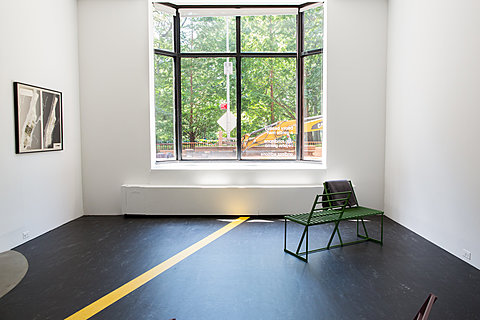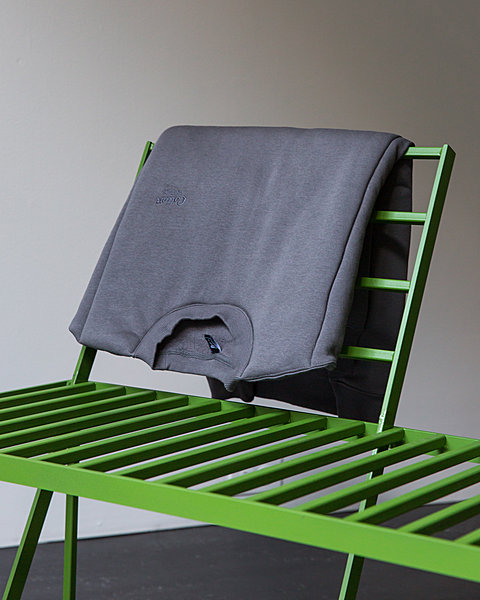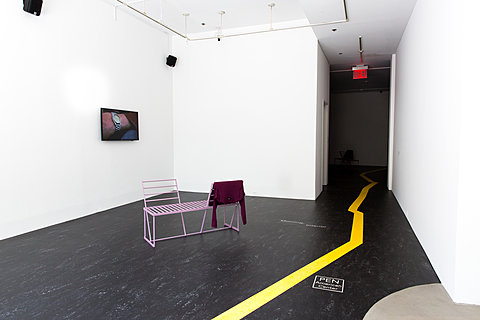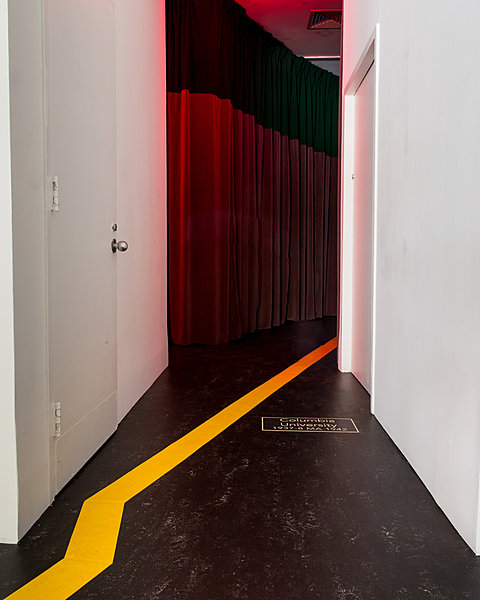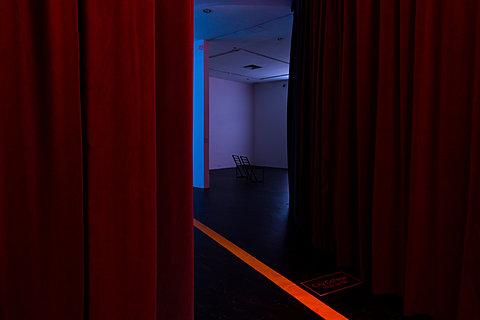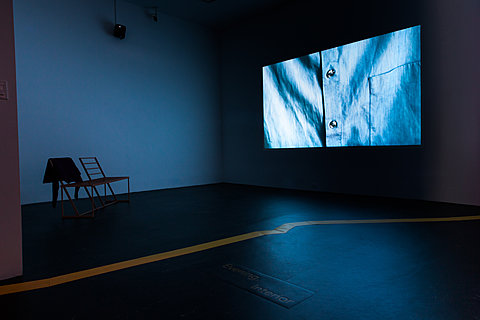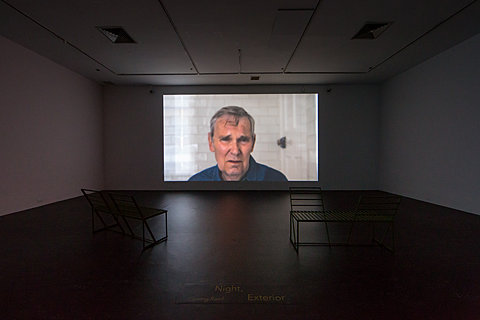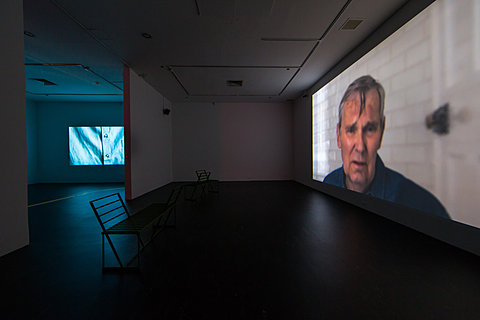The great problem of the short story, as Bernard Malamud puts it, is 'to say everything that must be said and to say it quickly, fleetingly, as though two people had met for a moment in a restaurant, or a railroad station, and one had time only to tell the other they are both human, and, here, this story proves it.
– Conversations with Malamud
A Gentle Man is inspired by a short story by Bernard Malamud. In a time where ceaseless brevity of encounter and communication is a way of life, the short story feels more vital than ever and the short form is at the heart of this exhibition. A Gentle Man is a video installation that transforms the length of the gallery’s five rooms into a journey, from day to night, with linoleum floors.
This newly commissioned four-part video portrait of an imaginary man from birth to the present (1940–2017) explores gentleness through its four discreet chapters: The First Story; Me for You; In the Rain/MAMA; A Man Walking Up Broadway. The work presents four short films, offering them as minor transgressions (of engagement, responsibility, cliché, profound love), and proposes their transformative potential as choices. Each chapter’s location, along with a floor design that traces Broadway through Manhattan, represents, symbolically, a different time of day – morning, afternoon, evening, and night – and, emotionally, an unspecified interior or exterior. In the exterior scenes, it is always raining. The floor design scarcely maps the space of Bernard Malamud’s early writing, and the short story, "Spring Rain" (1942), which is set around Morningside Heights. Malamud’s free education – from Flatbush to Harlem – is also mapped.
"Spring Rain" – written by the Brooklyn-born Malamud when he was 28 – was not published until 1989, three years after his death, and has received little attention. Beasley has been fascinated by the story for a decade, and at 80 Washington Square East, she has taken the opportunity to chase the story in Manhattan itself. 'Spring Rain' is a tender picture of interiority and a glimpse into a man’s experience of himself and responses to others. It is also about present-ness and time; a life and an evening flash into clarity for a moment as a result of watching a young man die at the beginning of the story and, later, whilst walking in the rain with his daughter’s boyfriend.
Using only existing light, the exhibition moves from day-lit front rooms on Washington Square to unlit rear spaces, illuminated here by large video projections. Kissing Chairs, designed as a multi-part sculpture by the artist, is presented in each of the rooms of the exhibition for visitors to sit on.
Chapter 1, Morning, Interior – The First Story. How a man came to engage as a writer and to write his first published stories / News of war from Europe / Recording the quotidian signs of ordinary life. Text extracted from Robert Giroux’s Introduction to The People & Uncollected Stories by Bernard Malamud, Farrar, Straus, and Giroux, 1989.
Chapter 2, Afternoon, Exterior (Spring Rain) – Me For You, 'Mir sol sein far dir', sung by Irving Grossman (1931). 'Mir soll sein far dir', or 'Me for you', is a Yiddish mother’s lament, which Malamud affectionately relates instead to his father: 'One day during the Depression, as I was lying in bed with a heavy cold, miserable because I had no job, (my father) came up the stairs from the store, and after we had talked a minute, he took my foot in his hand and said ‘mir soll sein far dir’ – ‘I’d rather it were I than you’. I’ve always remembered that.' Malamud Papers, Harry Ransom Humanities Research Centre, University of Austin, Texas (HRC 29.6) Extract of 'Mir sol sein far dir' translated from Yiddish: Every mother prays … If I could only suffer for you, if only I could suffer instead of your little bones, instead of your little teeth, my dear child It’s hard to forget her tender words: 'If I could suffer for you'.
Chapter 3, Evening, Interior – In the Rain / MAMA. Text: Extracted from ‘Spring Rain’ (1942) by Bernard Malamud 'When Malamud was making notes on his friend Howard Nemerov’s collection of poems, The Western Approaches (1975), he suddenly sketched out in the midst of them a little frail poem of his own. Written more than forty-five years after her death, it was headed ‘In the rain / MAMA’.'
In the rain / MAMA
Don’t go in the rain
Not in the rain, my son, she said
Or it will make you catch a cold
You will get sick
So don’t go in the rain.
Mama, when you died
I walked in the rain.
'I walked in the rain’ meant that finally, no one could or even should protect him. To become a free man with even a normal life meant taking defiant risks and feeling the pain and the loneliness that went with them. It felt like necessary disobedience and yet was still a cry of lostness.” Bernard Malamud: A Writers Life, Philip Davis, Oxford University Press, 2010, p7. In the rain / MAMA: the original script can be found at the Library of Congress: Malamud.
Chapter 4, Night, Exterior (spring rain) – A man walking up Broadway Music: Winterreise (The Linden Tree) by Schubert; Played in reverse Don’t be fragile Don’t be fragile Don’t be fragile Don’t be fragile
A note to himself, written by Bernard Malamud on Tuesday, March 18, 1986, the day he died. The original script can be found at the Harry Ransom Humanities Research Centre, University of Austin, Texas, Malamud Papers, Box 34 Folder 4 (HRC 34:4) Décor Linoleum (black, lilac & yellow).
‘Broadway’ floor design, six colored metal ‘kissing’ benches, four ‘sweater-cushions’, and ‘Palisades’ curtains.
Cartographer, Molly Roy’s beautiful map, Oscillating City – which charts population density in Manhattan by day and by night — from Nonstop Metropolis: A New York City Atlas, by Rebecca Solnit and Joshua Jelly-Schapiro, published by UCPress, will be exhibited in the first gallery as a prelude.
British actor, Russell Tovey (Looking, HBO; Quantico, ABC; Angels in America, Royal National Theatre, London) narrates.
Curated by Nicola Lees with Marguerite Wynter, 80WSE.
